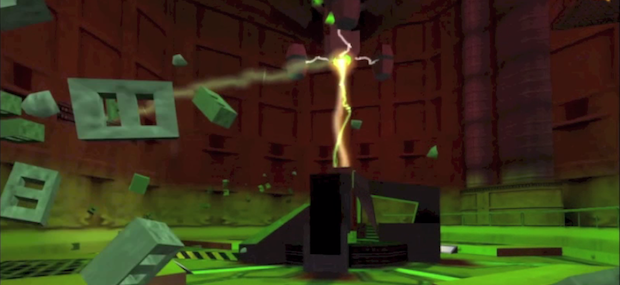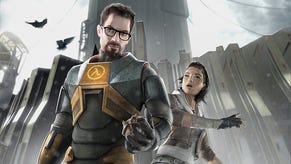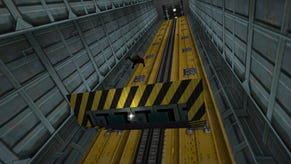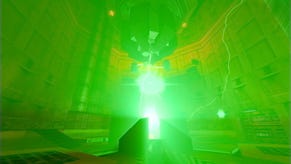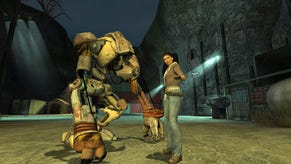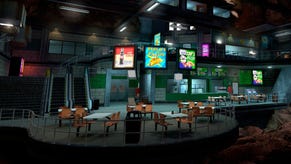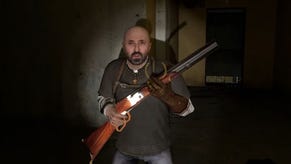Diary: Never Been Half-Lifed, Part One
G Man! G Man! G Man! G Man!
In the depths of late night despair you might sometimes lie awake thinking about how you are a life-long PC gamer and have never played through the original 1998 PC darling Half-Life. The thought lingers on you like some grotesque bug with the ability to whisper: 'You are an impostor. You are fake. You are phoney.' Well even if you don't have terrible self-esteem, I do. I'm like Drew Barrymore in Never Been Kissed. Except the kiss is Half-Life. And Gordon Freeman is that guy from Alias that ends up kissing Drew Barrymore awkwardly on a baseball pitch.
Or whatever.
Here's my first time with Half-Life, documented in badly made videos recorded whilst I was travelling Europe.
What strikes me most about my first time experience, now a few hours into the sci-fi epic Half-Life, is how much it makes me think of the golden age of Steven Spielberg's movies.
Okay, so that was a joke trailer. But there's no Youtube video online that can let you immediately see the delayed entrance of Indiana Jones in Raiders of the Lost Ark, so I can't show you that. But you remember don't you? The noise of South American cicadas, the fade in to the Paramount logo on a mountaintop. The tense music. A man is on a journey through the jungle. We cannot see his face. The main character is voiceless as others bustle around him. It's tense; we're on a journey but we don't know where. The audio puts us on edge. Intimidating things are happening around the characters, but we get the sense that the main character knows what he's doing - has been in this environment before. Voices imply that things could go wrong. Suddenly, we are introduced to our hero. He steps into the light.
Gordon Freeman has a delayed entrance - we are not only held at arms length as to who we are as we go along for the ride, but Gordon too has a literal delayed entrance to his workplace. It's a commute, and all the things that could go wrong are encircling his consciousness, through the polite, creepy lady who narrates, to the robots at work around him. It is implied that someone has recently died in the hazardous materials section of Black Mesa because they are recruiting for a replacement. Suddenly, we are introduced to our hero. You are Gordon Freeman, you are twenty seven years old, and you have a crappy level of security access.
(There is no way this guy is 27.)
Though I make jokes throughout the video, what I'm really feeling most of the time is a tenseness created by the level designers; an almost surveillance-like awareness of the player. The huge amount of meticulously scripted events are designed to scare or to provide a feeling of helplessness. There is a concerted attempt by the designers to make the player aware of how little power or control over the environment they have - just like Indiana Jones or whoever Jeff Goldblum plays in Jurassic Park, the tension comes from always feeling like they're arriving late to the problem, and then getting too deep into the problem, necessitating escape.
This creates in the player a permanent sense that they are running to catch up - and if you think about how both Raiders and Jurassic Park function, the tension is of 1) both writer and director conspiring to consistently make the characters feel like something is going to go wrong and 2) making the characters run, panicked, away from something that has gone wrong ('must go faster!'). The tension both in those films and in this game is one of desperation.
The very essence of Indiana Jones is that he is underprepared for what is about to happen but is resourceful in a clinch - Half-Life's makers couldn't have set Gordon up in a better mirror. He's a person who belongs in his environment, but is not prepared for what will happen. When you get a crowbar it feels like clinging to a lifejacket in an ocean that's actively trying to drown you. The level design is one of calculated cruelty that has only been subsumed by Dark Souls in complexity and scope.
Imagine, in Aliens: Colonial Marines, if they had made you feel powerless for most of your journey through the environment. Imagine they'd focussed on how to take player power away, how to make the player feel intimidated, make the player run or feel disgusted or conflicted with their own actions. Imagine they'd made the guns feeble - like in Aliens the actual film, where guns are nothing, the characters' macho stances and posturing meaning nothing in the face of the aliens. We're so gorged on making people feel powerful, godlike, that it was never considered.
Imagine if Call of Duty focussed on making the player run desperately instead of shooting liberally. It would connect more meaningfully with the player, that's narrative ammunition you can work with. Half-Life does this effortlessly, drops in absurd humour too. Scientists who moments before discussed their neckties with you are devoured in air vents and you feel bad. The dark joke of it is that you laughed and at the same time it gave you the willies.
More interesting still is that the fault for the initial meltdown appears (at least in the beginning) to be your own; the idea of game choice is more discussed these days with regard to The Stanley Parable, but if the only thing left to do in a room is push something into a reactor, and it triggers dire consequences, it stays with you that everything might be your fault. The narrative burden is on you, somewhat like the choices that The Walking Dead plays upon. You did it. Bioshock would use this sort of motif as a twist in 2007, but for me it came too late in the game to make a bigger impact: is the player's lack of choice really something that is a shock? Or is it more interesting that we willingly buy into the lack of choice if we have a small amount of autonomy or power over the immediate environment? Is it the Stanford Prison Experiment? Is it that we react this way to this kind of situation that makes human beings awful? All this from that one moment where I knew I'd make Black Mesa melt down.
Then there's the part in the first video where all I say is, 'I get it now. I get it.' I've played games with jump cuts before. But only at that one point does it become obvious to me how skilled in storytelling the Half-Life designers were, how completely certain of the player's experience they were. To show a flashforward without it being a cutscene - it still seems absurd. Why aren't we doing more games like this now? Why are cutscenes still around when storytelling can be this good without them? Instead of moving the camera, why don't we move the player character? I guess that's what you call vision. It's Kubrick.
And then there's the microwave. It's those little moments they constructed - those drinks machines that don't work, the soup exploding. Whenever I talk to anyone who has any affection for this game, it's the microwave they always mention, with a grin.
In any case, the First Aid points might not be the BRILLIANT GENIUS in design I... initially envisioned. It might actually just be a mistake. But I like to think that they created the player facing the box function just to mess with us.
It's passe, or not de rigeur, and other French phrases, to discuss games with regard to film now to a certain extent. Part of me thinks that this is due to David Cage prancing about like a ninny all over things thinking that eliciting an emotional reaction stems from our ability to look at a high-res cryface. This without ever thinking that our most emotional moments with games are always created by the red hot soldering of intelligent game mechanic to narrative, like the pang that you are taking away necessities from your family to help others in Papers, Please or the heartbreak that you are accompanying a stranger to both your doom in Journey. There's also a sense that games are cowed by film; 'Films are accepted!' we cry, 'Games are not!' But that isn't important. Games matter to us, and that's enough.
And yet I think we still have something to learn from film - just not the things we have so far most frequently stolen. Take the cutscene/violence dynamic. 'You know the thing that doesn't work for me in these games,' Steven Spielberg said to Tom Chick, 'are the little movies where they attempt to tell a story in between the playable levels. That's where there hasn't been a synergy between storytelling and gaming. They go to a lot of trouble to do these [motion-capture] movies that explain the characters. And then the second the game is returned to you and it's under your control, you forget everything the interstitials are trying to impact you with, and you just go back to shooting things. And that has not found its way into a universal narrative. And I think more has to be done in that arena.'
But perhaps we're learning from film. Don't you remember feeling surprise and delight at Thirty Flights of Loving's jump cuts? Do you remember the first time you played Shadow of the Colossus and as you rode out into green haze on your horse, the camera drifted to a cinematic wide shot and the sun scarred the camera, making the hoofbeat into a pulse and the game stretch out into a possibility space where you, the lowly wanderer, had control over everything? Cutscenes can only do so much. Here's what Half-Life gave us: The ability to believe that cutscenes might not be necessary to narrative for the traditional FPS game. And that messing with the player's sense of control and power in an environment is not only okay - that it's what makes us pay attention, what makes us respond, what makes our heart beat faster. It puts us in Jurassic Park.
I've still to see Half-Life's Tyrannosaurus Rex though. Perhaps that is being saved for later.


